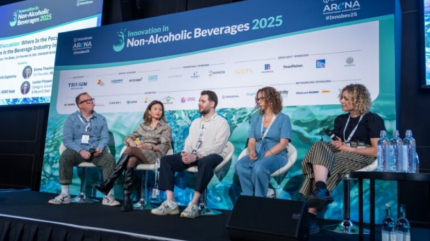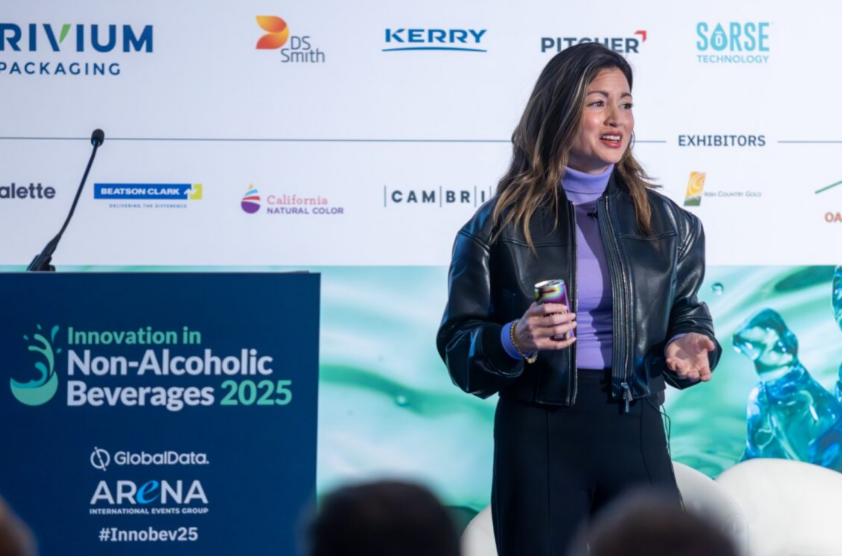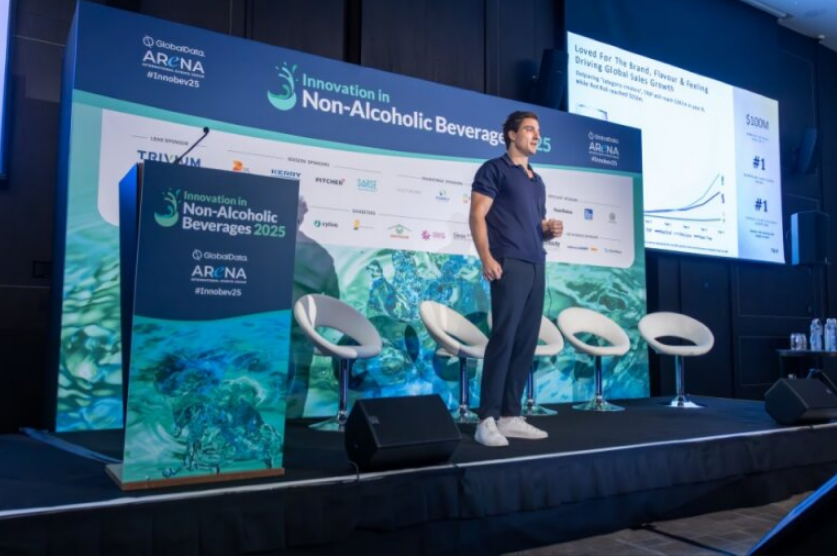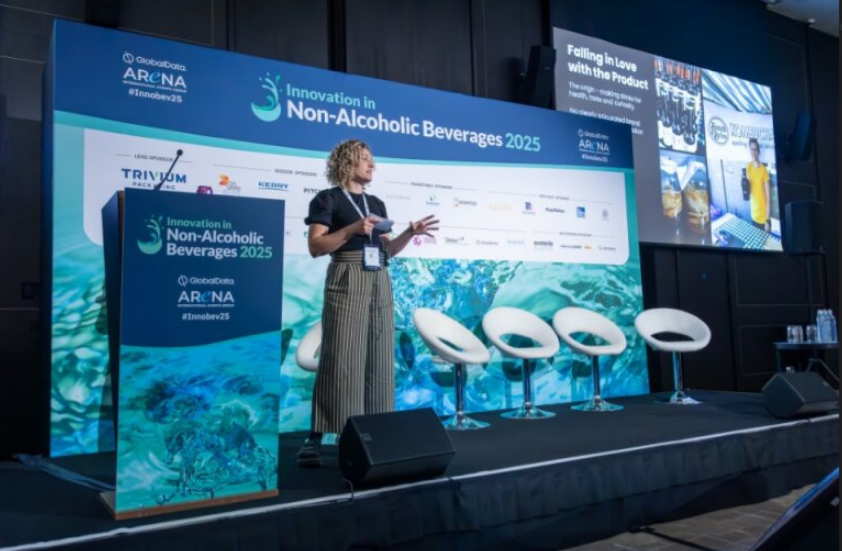
The conversation around non-alcoholic drinks has never felt more culturally relevant and, at the Just Drinks Presents: 14th Innovation in Non-Alcoholic Beverages 2025 conference, the category’s evolution was on full display.
During the two-day event in London, drinks brands and ingredients specialists gathered to explore how consumer habits are shifting and what that means for the future of drinking.

Discover B2B Marketing That Performs
Combine business intelligence and editorial excellence to reach engaged professionals across 36 leading media platforms.
From the rise of GLP-1-friendly formulations to mindfulness-led products and gut-health innovation, the discussions highlighted a sector moving beyond simple alcohol alternatives to redefining the role that different drinks can play in everyday wellbeing.
Non-alcoholic spirits no longer niche
Ben Branson has been at the vanguard of the development of non-alcoholic alternatives to spirits, having sold his first business, Seedlip, to Diageo and, in 2023, launching venture-studio Pollen Projects.
He told the event most non-alcohol brands are still less than three years old but said their emergence reflects a wider cultural transition: not a complete spurning of alcohol but a gradual rethinking of how drinking alcohol fits into our daily lives.
He said: “Whilst there are over 1,000 brands in the non-alcohol space globally, 90% of them are probably three years and under.

US Tariffs are shifting - will you react or anticipate?
Don’t let policy changes catch you off guard. Stay proactive with real-time data and expert analysis.
By GlobalData“This is not a rejection of alcohol; the bigger question here is about the future of socialising. Most nightclubs are going to close by 2030, when there were 10,000 around ten years ago.”
Branson insisted non-alcoholic spirits are no longer seen as a niche alternative. “The way we live our lives has dramatically changed and our social lives are going to change as the non-alcoholic category continues to grow. If we don’t build fantastic brands with high-quality liquids, we will let down the consumer.”
UK-based non-alcoholic spirits producer Crossip was launched by Carl Brown and Tim Blake in 2020. Blake, also the company’s commercial director, highlighted its work with the on-trade as a key part of its strategy. “We work with the on-trade to champion premium drinks without alcohol,” he said, adding: “Crossip was born in a bar, not a boardroom.”
Blake argued premium non-alcoholic options are not only lifting consumer perceptions but can also help the on-trade.
“Better options equal better footfall and loyalty in hospitality venues,” he said. “Premiumisation is so important in our category, and it signals to your consumers that you take quality seriously.”
Ingredients innovation
Major names in ingredients are working closely with brands keen to tap into rising consumer interest in moderation.
Christina Furlong, global insights manager at Kerry, shone a spotlight on one of the hottest health trends in food and beverage: the increasing use of GLP-1 weight-loss drugs and how that’s affecting consumer behaviour.
Furlong said the average GLP-1 user is increasingly seeking balance – moderating their alcohol intake and looking for functional food and drinks.
“GLP-1 users are very interested in learning health benefits. They are adapting to changing appetites and can experience side effects like nausea, meaning that they’re much more intentional towards which health agents they take,” she said.
“They are also interested in maintaining a balanced budget. These drugs are extremely expensive for most people and, if you’re adding supplements and things to top up your diet, that just compounds even further.
“Because GLP-1 target the reward centres of the brain, people are drinking less alcohol. The average GLP-1 consumer is now looking for more balance, but with less alcohol.”
GLP-1 users have an insatiable thirst, so there is a huge desire for products that provide nutrients and enhanced hydration
Christina Furlong, Kerry
Rather than relying on supplements or pills, Furlong added GLP-1 users prefer to build health benefits into their everyday diet, creating an opening for beverages that deliver flavour and function.
“We know from research that people do not like to take pills and would much rather implement those health benefits into their diets, if they can,” she said.
“Weight management has grown 22% in the past three years. In most cases, it’s tough protein and digestive combination that we’ve seen emerge as something that’s complimentary to their diets. This is especially in the US but it’s still starting to emerge here in the UK.”
With around 6% of the US population now using GLP-1 medication, according to Furlong, there is a fast-expanding market for products that address the side effects of these drugs – particularly the “insatiable thirst” many users experience.
“GLP-1 users have an insatiable thirst, so there is a huge desire for products that provide nutrients and enhanced hydration.”
As a result, Furlong said that enhanced hydration and nutrient-rich formulations could become a major new growth channel for drinks brand brands targeting this health-conscious demographic.
Hemp offers opportunity
US-based Sorse Technology is helping to bridge the gap between functional science and mainstream appeal through its work with hemp-derived ingredients.
Rather than supplying the raw plant, the company specialises in water-soluble emulsions that allow cannabinoids such as CBD to be easily integrated into beverages and other consumer products.
By improving the stability, consistency and taste of hemp-based ingredients, Sorse Technology is helping brands bring new formats to market – from relaxation-focused sodas to recovery drinks – that meet the interest in drinks with benefits.
The brand’s founder, Tim O’Neill, described cannabis as a “mainstream consumer product”, noting the legal market in the US is already worth around $30bn annually and is expected to reach $35bn by the end of 2025.
O’Neill said: “US THC beverage sales topped $1.1bn in 2024. Despite the rapid growth, the THC category is still in its early days.”
The drinking habits of the much-coveted Gen Z cohort are being closely watched. O’Neill said those consumers “are drinking less alcohol and embracing cannabis alternatives”, arguing there is now a “growing demand for hangover-free socialising amongst sober-curious consumers”. He added: “This means that a new drinking culture is emerging.”
Mindfulness drive
A recurring theme throughout the event was the changes in socialising – and no demographic is shaping that conversation more than Gen Z.
Data shows the cohort is drinking less than its predecessors did at the same age, going out less and are more interested in non-alcoholic alternatives (whether that persists as Gen Z ages is a matter of debate).
Either way, it’s clear to see many Gen Z consumers are looking for balance. Brands like Kin Euphorics and Trip are looking to offer function with flavour.
For US-based Kin Euphorics, mindfulness and functionality go hand in hand. The company has built its identity around what founder Jen Batchelor calls “brain care” – crafting drinks infused with nootropics and botanicals designed to oxygenate the brain and support mental clarity.
Their beverages are “restorative rather than addictive or psychedelic”, positioning Kin Euphorics as a wellness-led alternative that, it says, helps consumers feel balanced.

Batchelor said she sees Kin Euphorics as the “Spotify of beverage”, drawing parallels to how people discover adopt and share drinks that align with their moods and lifestyles.
“Alcohol is obviously cognitive detracting, so we want to be able to have ingredients in it that will elevate mood and improve the brain,” Batchelor says.
“We turned to mental health products with the aim of making cognitive care and the conscious connection available at the bar and beyond, using strategies from the world of beauty and care.”
Batchelor believes today’s consumers are more informed than ever, with platforms like TikTok turning wellness trends and ingredients science into mainstream conversation.
“To the next generation of consumers, a calm nervous system is the ultimate flex. Nootropics offer an edge that makes feeling easy look breezy,” she says.
UK-based Trip has become one of the most recognisable names in the market for more ‘mindful’ drinks, positioning itself at the intersection of wellness, functionality and calm.
Its range includes drinks containing CBD, magnesium and natural adaptogens – ingredients chosen to help consumers relax, unwind and focus without the effects of alcohol.
Co-founder Daniel Khoury highlighted how “one in three consumers now buy products that support their mental wellbeing”, signalling a major cultural shift in how people approach everyday self-care.
Anyone can launch a drink with magnesium or CBD but that doesn’t automatically give you a non-alcohol proposition
Daniel Khoury, Trip
However, he said that, while there’s a “very low barrier of entry for brands putting ingredients in their functional drinks”, that won’t mean a product lands with consumers.
He adds: “Anyone can launch a drink with magnesium or CBD but that doesn’t automatically give you a non-alcohol proposition, because this generation of Gen Z don’t choose the non-alcohol proposition through a straightforward product.”
For a functional drink to succeed, the product “needs to suit any occasion, like something you can have at lunch or something you can have at your desk at work”, Khoury said.
He added: “We’re not trying to knock you out at lunch so that you can’t work in the afternoon. We have to accept that a drink is a drink, and you have to play by the rules of beverages.”

A “new wave” of growth for alkaline waters
Actiph is a UK bottled-water business offering alkaline-ionised waters (as well as a range of flavoured vitamin waters and energy drinks).
Positioned as “water plus”, the brand is built around the promise of enhanced hydration through its alkaline formulation.
Actiph founder Jamie Douglas-Hamilton said the product area was entering a “new wave” of growth, with US consumers in particular driving demand for products that go beyond basic refreshment.
Douglas-Hamilton said that there’s been “over 400 clinical studies since the 1960s that analysed and proved how much faster alkaline water is absorbed into the blood,” adding that alkaline water is “not a fad” and is “here to stay.”
He continued: “As a result, people feel the difference of drinking alkaline water. That’s why it’s the fastest growing beverage category in the world. Most of the growth is from Japan, Asia and America but that is coming through to Europe.”
With health and wellness benefits increasingly influencing purchasing decisions, Actiph’s strategy is to frame alkaline water not just as a drink but as part of a broader lifestyle shift.
The rise of gut health
Gut health has rapidly evolved from a niche wellness concern into one of the biggest drivers of innovation in the non-alcoholic category. With consumers increasingly aware of the connection between the gut, the brain and overall wellbeing, brands are racing to create products that not only taste good but actively support digestive health.
Functional beverages like kombucha, kefir and prebiotic sodas are leading the charge, which has caught the eye of major corporations like PepsiCo – which recently acquired US gut-health soda brand Poppi – signalling that ‘probiotic and prebiotic ‘gut-friendly’ drinks are becoming more mainstream.
Among the companies shaping the category is UK-based Hip Pop, which offers kombucha and gut-friendly sodas.
Hip Pop co-founder Emma Thackray said consumers are subconsciously thinking about gut health in a new way – not just as a medical or dietary concern but as part of everyday wellbeing.
“I would like to open people’s minds to a much broader diet, including ferments, kombucha and fibre-filled foods. Our aim is to create delicious drinks with cleaner ingredients that help with gut health,” Thackray said.
After several rebrands “to open to that mass market audience, so people knew there was great taste inside”, the company’s growth trajectory has skyrocketed. “We produced 4m cans last year and we are on track to produce 10m cans by the end of this year,” Thackray said.

Based in Suffolk in eastern England, LA Brewery makes sparkling, fermented kombucha drinks that blur the line between tea and vinegar – a balance that brand founder Louise Avery says gives the brand a distinctive, refreshing flavour.
Founded in 2017, the company champions fermentation as both an art and a tradition, with Avery noting that “fermented drinks are not a trend – they’ve been here forever.”
As for the health benefits of LA Brewery’s products, Avery says its drinks “stop a blood sugar spike”, adding: “If you have a little bit of citric acid in there with the sugar, it will prevent the blood sugar spike, which is essential to our long-term health.
However, she also told the event that, while consumers are drawn to beverages with functional claims, taste remains the most important driver of repeat purchase.
“Consumers in the UK and EU functional beverage market now seek functional drinks with health benefits. Whilst function is important, great taste remains the highest priority,” she says.
Gut health is a very big talking point at the moment
David Begg, The Real Co.
Since its founding in 2017, UK-based The Real Co. has sought to carve out a niche by offering naturally fermented sparkling teas that promise “all the flavour of a fine wine but without the alcohol”.
Founder David Begg said “the majority of consumers” are trying to moderate their alcohol consumption, with “90% of the 25-34 age group doing so”. Health, he argues, is the key driver.
“Alcohol consumption is an expectation of us whenever we go out. We are essentially poisoning ourselves (in tiny amounts) each time we drink, and younger consumers are now pushing against that,” Begg said. “Health and lifestyle changes are the primary drivers of that.”
Furthermore, with increasing awareness around gut health and digestive wellness, the interest in fermentation is rising, he said.
“Gut health is a very big talking point at the moment,” Begg said. “The functional benefits included within pro, pre and postbiotics are being talked about a lot more. Consumer awareness of what’s going on in gut health has changed dramatically over the last few years, and we’re starting to recognise how important that is. The research is now starting to catch up on the fact that fermentation is an important part of our diet.”
As more consumers moderate their alcohol consumption and interest in more ‘functional’ drinks continues to grow, more drinks are emerging to cater to that demand. From kombucha to sparkling teas, brands are proving that wellness doesn’t have to come at the expense of enjoyment.





